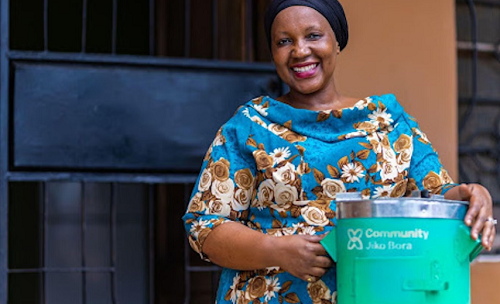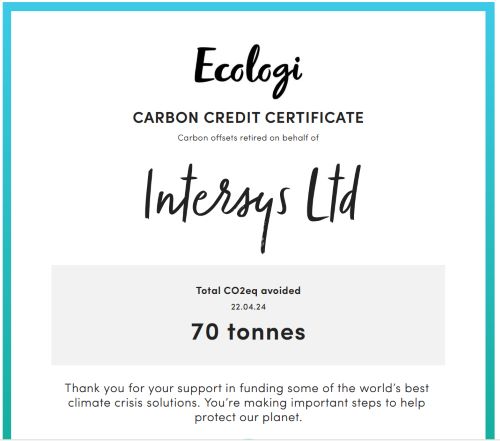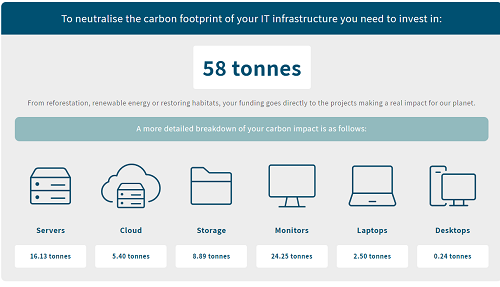
Did you know that the modern environmental movement was born on 22 April 1970?
This was the date of the first Earth Day, which mobilised millions of Americans to take part in environmental activities.
Since then, it has evolved into the largest civic event on Earth, with billions of people across 192 countries working together to fight for a sustainable future for the planet.
‘Billions of people’ sounds overwhelming and even abstract, but of course it’s the many individual decisions to take action that drive real change.
That can include companies, too. We’ve long been aware of the sustainable IT issues in our industry. In fact electronic waste, or e‑waste, is the fastest growing solid waste product in the world.
Only 17.4% is documented as formally collected and recycled and huge volumes end up in landfill, where dangerous chemicals can leach into the soil.
Admittedly, it has been hard in recent years to distinguish between the organisations showing a genuine interest in sustainability and those piggybacking on a cause for some cheap PR.
We’d like to show you that this isn’t an opportunistic post on the back of World Earth Day, but a relevant moment to show you our genuine sustainable IT practices and credentials as a green IT company.
So, we’ll refrain from the ‘We are committed to…’ corporate speak and provide you with some facts about our work in sustainability.
Sustainable IT: carbon offsetting
In 2023, we took steps to offset our carbon footprint by delivering over 50 tonnes of carbon credits in collaboration with Co2e.tech. These were invested across three global social and environmental causes.
They included:
- Contributing to the The Proyecto Mirador carbon offset project, which helps to build and distribute energy efficient and life-saving cooking stoves for rural families in Honduras.
- Supporting the conservation of 39,301 hectares along the banks of the Jurupari River in the Amazon. Part of an Envira Amazonia project, it aims to conserve tropical rainforests and their role as carbon sinks.
- Clean energy generation in south India. A wind farm project aims to generate 60 MW of clean electricity. This will be exported to the Indian electricity grid and will directly displace electricity that would have been generated from coal and gas.
Working in partnership with Co2e.tech, we successfully retired 51 carbon credits last year.
We’re a carbon neutral IT company in 2024

We’re proud to say we have achieved our long-standing goal of going carbon neutral this year. Put simply, it means that we have offset our emissions by investing in carbon credits that stop greenhouse gas emissions.
This year we’ve partnered with Ecologi.com, who help SMEs reduce their carbon footprint.
In order to achieve carbon neutrality for our technical environment and infrastructure, we needed to retire 58 tonnes of CO2eq (carbon dioxide equivalents, which are a metric measure used to compare the emissions from various greenhouse gases based on their global warming potential) from the environment.

We’ve gone further and retired 70 tonnes of CO2eq by investing in renewable energy carbon avoidance projects to offset the rest of our business operations.
Carbon avoidance projects stop greenhouse gas emissions from entering the atmosphere by lowering the sources of emissions. They also help restore biodiversity and support local communities by providing skills training and employment.
We’re really excited about supporting:
- Peatland restoration and conservation in Indonesia — The Katingan Restoration and Conservation Project aims to safeguard and rejuvenate 149,800 hectares of peatland ecosystem. Indonesia is home to some 36% of the world’s tropical peatlands (natural carbon sinks) which are under threat from deforestation.
- Solar power project in Morocco — The Ouarzazate is one of the world’s biggest concentrated solar projects. It uses thousands of concave mirrors to generate 750 GWh of power each year. The project is a key driver of Morocco’s move towards more sustainable energy. The country still relies on heavily on fossil fuels and such projects are driving real change.
- Fuel-efficient cookstoves in Uganda — UpEnergy is a social enterprise in Uganda which helps low income communities access clean cooking technologies and protect local environments through a range of activities. They distribute fuel-efficient charcoal cookstoves to thousands of families. The Community Carbon stove is a durable stove that reduces charcoal consumption by up to 55%. It also helps families save on annual fuel costs. This money can then be used for other basic necessities such as health care and education. The cookstoves are entirely locally manufactured thus helping to create jobs.
Incidentally, we’d highly recommend both Co2e.tech and Ecologi.com to any of our partners looking for an ethical carbon credit scheme.
And the small sustainability actions that make a big difference…
So much for the headline sustainable IT commitments. But we also do the detail and make sustainable choices at every opportunity. We know it’s the right thing to do and what you expect from us.
Our activities include:
Sourcing a green energy supplier. We choose Green Energy Electricity Supplies, which delivers 100% green gas and electricity.
Using energy efficient appliances, such as the eco-friendly air source heating pumps in our London and Cornwall offices.
Using energy responsibly. From monitoring heating and lighting to installing low-energy bulbs and motion sensor lighting, we treat energy as a precious resource.
Recycling. We use recycled paper and refurbish products where it doesn’t detract from user experience, as well as using biodegradable chemicals where practical.
Travel. We use public transport to get to client sites wherever possible. In and around London, this may account for as much as 70% of our travel.
You can download our carbon credit certificate here.
To see more detail about what we do in sustainable IT, to further back up our claim to be a green IT company, see our environmental policy.